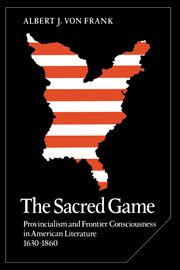Book contents
- Frontmatter
- Contents
- Dedication
- Preface
- Introduction: provincialism and the frontier
- 1 “But enmity this amity did break”
- 2 Brother Jonathan
- 3 “A musy in the thicket”
- 4 Geoffrey Crayon and the gigantic race
- 5 Hawthorne's provincial imagination
- 6 Working in Eden
- 7 Life as art in America
- 8 Reading God directly: the morbidity of culture
- Postscript: tradition and circumstance
- Notes
- Index
Postscript: tradition and circumstance
Published online by Cambridge University Press: 07 October 2011
- Frontmatter
- Contents
- Dedication
- Preface
- Introduction: provincialism and the frontier
- 1 “But enmity this amity did break”
- 2 Brother Jonathan
- 3 “A musy in the thicket”
- 4 Geoffrey Crayon and the gigantic race
- 5 Hawthorne's provincial imagination
- 6 Working in Eden
- 7 Life as art in America
- 8 Reading God directly: the morbidity of culture
- Postscript: tradition and circumstance
- Notes
- Index
Summary
The examples of Margaret Fuller and Ralph Waldo Emerson make for a convenient if not altogether mandatory stopping place. They state, in their respective intellectual lives, two divergent responses to a problem that had dominated the cultural life of America from the beginning. Indeed, they may be said to sum up on the eve of the great changes that came with the Civil War the two positions it was then possible to assume with respect to the issue of provincialism. Furthermore, they illustrate in their contrasting views and contrasting mentalities the range of effects that frontier consciousness might conspire with the environment to elicit.
Frontier consciousness is not, as we have seen, merely or simply a provincial mentality; rather, it is a complex, evolved, and often contradictory consciousness, a rich mix of motives, inclinations, and protests – of protests especially. It is a term, first and last, for a searching and unsatisfied mind. The evolution of frontier consciousness has its origin in the tendency of a wilderness environment to accept immigrants while rejecting the immigrants' culture. Thus it is characterized by a conviction of loss and degradation, by a diminished certitude about personal identity, and by a sense of narrowed horizons in a large and empty land.
Information
- Type
- Chapter
- Information
- The Sacred GameProvincialism and Frontier Consciousness in American Literature, 1630–1860, pp. 154 - 158Publisher: Cambridge University PressPrint publication year: 1985
